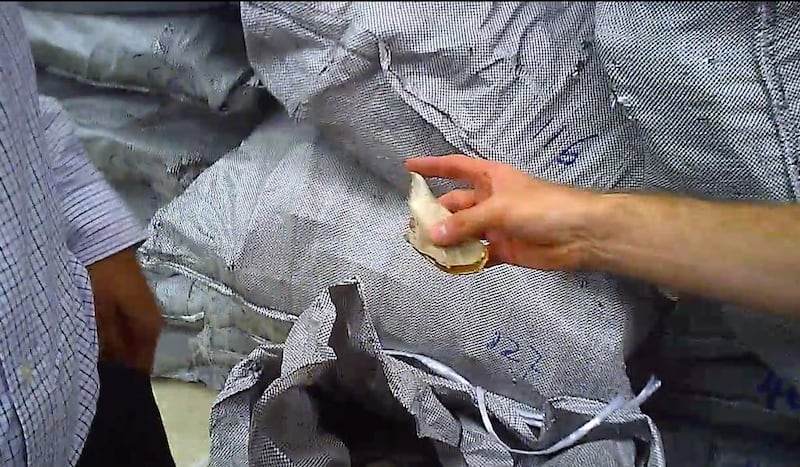DUBAI // A shipment of dried shark fins that was exported to Hong Kong has stirred protests among conservation groups in the Far East.
Bags – an estimated 136 containing more than six tonnes of fins – were discovered at the premises of a seafood trader in Hong Kong this month.
The find has sparked a social-media campaign.
In an article published on April 17 in the South China Morning Post, a Hong Kong-based English-language paper, the conservationists voiced concerns over the legality of the methods used to catch the sharks.
They also criticise Philippine Airlines, which transported the produce from Dubai to Hong Kong.
Conservationists and marine scientists have long been critical of the practice of consuming shark fins, saying that, in the majority of cases, illegal methods are used to catch the fish.
Demand for shark fins is predominantly from Asia with Dubai a major re-export hub for the trade.
Consuming the fins, in a traditional broth, “is still a very significant part of Chinese culture” as well as a status symbol, said Alex Hofford, a conservation photo journalist who discovered and photographed the shipment.
“It shows that you have arrived, to some extent, in the middle class,” said Mr Hofford, who is also an activist with WildLifeRisk, a Hong Kong-based conservation group.
With affluence rising in China and across Asia, conservationists fear the depletion of shark populations will only get worse. About 500 species of shark and rays are known to science and of these 74 are registered as threatened by the International Union for Conservation of Nature.
One tactic to curb the trade has been to put pressure on airlines to stop transporting shark fins. Currently 17 airlines, including Hong Kong’s de facto flag carrier, Cathay Pacific, as well as Dubai-based Emirates, have announced they are no longer transporting shark fins.
But, as some airlines shun the trade, others are picking up the business, Mr Hofford said, explaining the decision to start a campaign petitioning the airline to stop providing routes for the trade.
On April 23, Philippine Airlines bowed to the pressure and also announced it would stop transporting fins. The airline said on its website that it would “circulate a policy for immediate implementation and strict compliance across the organisation”.
Meanwhile, the UAE Ministry of Environment and Water has investigated the shipment.
“After reviewing all the information, it appears that all the relevant import and re-export documents are accurate and were not in breach of any national legislations for the trade in marine products,” the ministry said.
The fins were taken from several species of sharks that were imported to the UAE and then re-exported to Hong Kong via Manilla on Philippine Airlines.
“Had there been anything illegal with this shipment, the company would have faced severe consequences based on the penalties established by Federal Law 23 of 1999 concerning the exploitation, protection and development of the living aquatic resources in the UAE,” the ministry said.
When the pictures and footage from Hong Kong were shown to marine experts they were not able to find irregularities among the limited evidence provided. It was impossible to tell, for example, how the fins were harvested. In many cases, fishermen cut the fins off sharks while they are still alive and then release the animals back into the water, where they die in an agonising manner, effectively drowning.
Dr Ralf Sonntag, director of the International Fund for Animal Welfare (Ifaw) Germany and a marine scientist, said the practice was very wasteful since it uses between only 1 per cent and 5 per cent of a shark.
“Sharkfinning is not only a huge conservation issue it is also against all international standards of animal welfare because many sharks are alive when they are thrown overboard with their fins cut off,” he said.
The practice is banned in the UAE, where fishermen have to bring the whole shark to port. The ministry has also introduced additional limitations on local shark fishing. Sharks cannot be targeted from January until the end of April, while regulations seek to limit the number of licensed dhows and prohibit the catch of two sawfish species and the whale shark, which are vulnerable to overexploitation globally.
From September 14 this year, the global trade in several species of endangered shark will enter a more closely controlled regime under the Convention on the International Trade in Endangered Species of Wild Fauna and Flora (Cites). The changes will affect the UAE as well because some – three species of hammerhead sharks and the oceanic white-tip shark (Carcharhinus longimanus) – are found across the region.
In February, the ministry held a workshop with Ifaw to train officials about the changes. The training included a workshop on how to recognise the dried fins.
“These workshops will be continuously organised in the lead-up to September to ensure all stakeholders are ready to implement the new measures,” the ministry said.
vtodorova@thenational.ae





